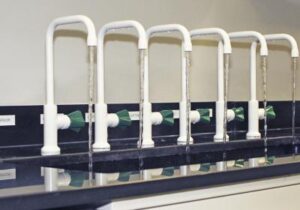 Louisville Water will be conducting a research project that will help utilities better understand using a chemical compound called chlorite in drinking water treatment. The Water Research Foundation just approved Louisville Water’s research project entitled “Risk Benefit Assessment of Chlorite as a Co-Disinfectant for Nitrification Control.”
Louisville Water will be conducting a research project that will help utilities better understand using a chemical compound called chlorite in drinking water treatment. The Water Research Foundation just approved Louisville Water’s research project entitled “Risk Benefit Assessment of Chlorite as a Co-Disinfectant for Nitrification Control.”
Currently, Louisville Water’s drinking water system uses chloramine in its water treatment technique. Louisville Water’s water quality department carefully monitors and maintains the levels of chloramine in our distribution system — in fact, the state requires a chloramine level of 0.5 parts per million at the customer’s taps. Chloramine assures the water remains clean and safe as it travels through the distribution network to the customer’s tap.
Nitrification is a chemical process that happens as water ages in the distribution system. Significant nitrification can cause the loss of chloramine and result in discolored water, taste and odor issues, and microbial regrowth in the distribution system. While we have many protocols (like flushing and tank draining) in place to combat nitrification, new treatment techniques should be explored. In this research project, Louisville Water will be assessing the relative risk of adding chlorite as a nitrification control technique and comparing that to other major treatment techniques under the United States’ Environmental Protection Agency’s Comparative Risk Assessment Framework.
The project Principal Investigator is Director of Water Quality Dr. Rengao Song and Co-Principal Investigator is Manager of Water Research & Development Dr. Eric Zhu. Spencer Bruce, Louisville Water President and CEO, summarized the project’s importance to the company and the communities Louisville Water serves.
“Louisville Water understands that this proposed project will help the water industry better understand chlorite treatment, another innovative technique being developed at Louisville Water, for nitrification control, which is the key to maintaining disinfectant residual in a chloramine system,” said Bruce. “The findings of this research will potentially provide the water industry a robust and cost effective secondary disinfectant strategy; therefore, creating another advancement in protecting public health.”
Song said that researching other ways to fight nitrification of water in distribution systems will help the company’s efforts in selling to more wholesale customers as well. The longer the water can stay fresh, the larger our wholesale customer reach can be. New lines of revenue, like selling to wholesale customers, helps keep water rates affordable for Louisville Water customers.
“This research project is also critical for Louisville Water’s strategy to sell more water to wholesale customers, who may be farther away from our treatment plants,” Dr. Song said.
The project starts this month and will last about two years. The Water Research Foundation is a leading not-for-profit research cooperative that advances the science of water to protect public health and the environment.

